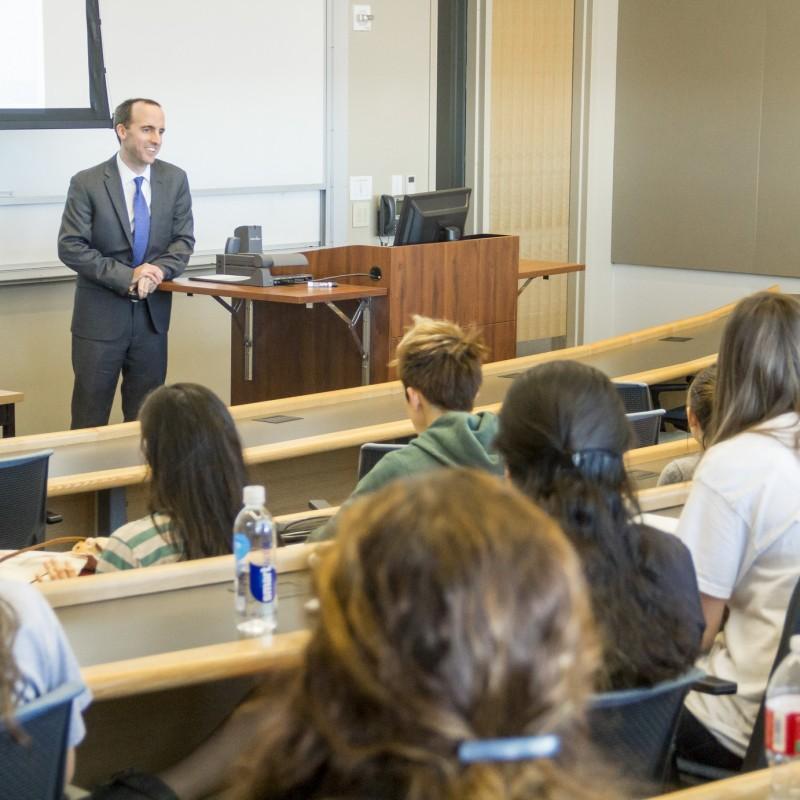This past week, the Trinity psychology department hosted a series of colloquia presented by visiting professors, faculty members and researchers. Each colloquium was a presentation of the individual’s research and was required attendance for all students in supervised psychology research.
The first presentation on Jan. 22 was given by Chelsea Ratcliff from the University of Houston who presented her research titled, “Exploring Mind-Body Interventions to Improve Health and Quality of Life in Individuals Facing Medical Illness.” The speech explored the concept of mind-body interventions, with aims at improving health and quality of life in individuals facing medical illness. Following this colloquium, William Ellison, of Brown University presented on the issue of borderline personality disorder, or BPD, titled “Borderline Personality Disorder: Toward Personalized Diagnosis and Intervention.”
“Here is how the American Psychiatric Association defines it: there are nine symptoms or criteria. The key for this disorder is instability,” Ellison said. “People with this disorder have instability in emotion, they have mood swings, a lot of behavioral instability, a recurrent self injury or self harm, they have a lot of anger outbursts, strange or erratic behavior in relationships and they tend not to be able to say with confidence who they are.”
Ellison went on to elaborate how borderline personality disorder is diagnosed in the Diagnostic and Statistical Manual of Mental Disorders.
“The DSM requires five of the nine criteria to get diagnosis, so a psychiatrist, if its zero through four they don’t get a diagnosis,” Ellison said.
Ellison continued to state the various problems with such a method of diagnosis.
“It says that any five of the nine but it doesn’t make any distinction between […] To me thats somewhat ridiculous,” Ellison said. “There are 256 different combinations for criteria for this diagnosis. It’s not so helpful and as a clinician as I see a lot of variety and it is striking how different they are from one another yet they have the same diagnostic level. Are these criteria really as interchangeable as the DSM makes them?”
To Cole Evans, junior psychology major, Ellison’s take on the distinction in borderline personality disorder criteria offered a different approach to the subject.
“I found Dr. Ellison’s talk about the potential issues with the classification of borderline personality disorder, very enlightening,” Evans said. “It shows how clinical diagnostic disputes and issues still persist in the psychological community despite the release of the DSM.”
Following Ellison’s talk, postdoctoral fellow for the psychology department, Lisa Kilpela presented her research, titled “Translational research of emotional and behavioral dysregulation: from transdiagnostic dimensions to treatment”. In her colloquium, Kilpela looked at translational research, in principle the application of research findings across a variety of contexts to enhance human well-being and health. In her presentation Kilpela looked at Dialectical Behavior Therapy (DBT), which is a cognitive behavioral treatment originally developed to treat individuals with BPD.
Kilpela went on to elaborate on her findings and research around DBT, remarking on the importance of the underlying theory and application.
“One thing we really want to take into account in the behavioral sciences and psychology is theory, and theory-driven hypotheses,” Kilpela said.
She continued to discuss a variety of data and research, showing how the findings could be used to further the use of DBT in successfully treating patients.
“If we can identify and address an underlying dimension that goes across psychopathology then we can train clinicians to treat those dimensions,” Kilpela said.
To students of the department, the opportunity to hear faculty and researchers share their studies offered insight into the field.
“The colloquia are a great way for students performing research in the department to get an idea of how to present their findings in a professional manner,” Evans said. “It was interesting to see former psychology majors, who’ve now gotten their Ph.D.s, present their research.”







